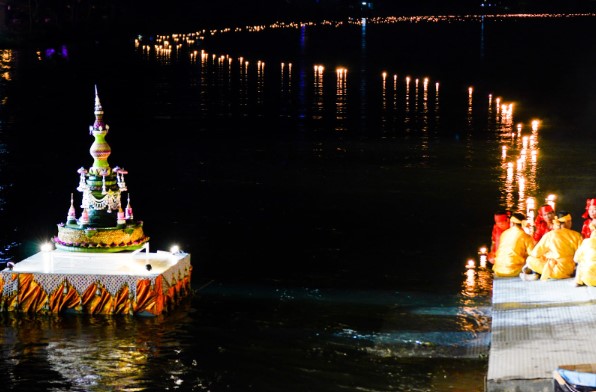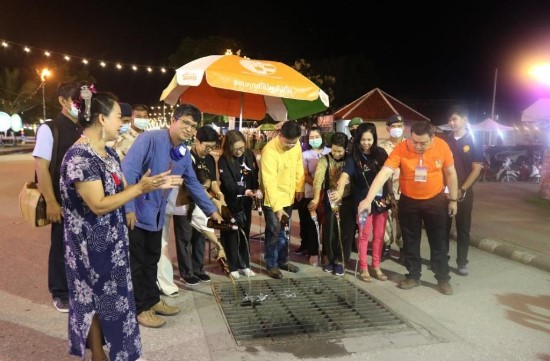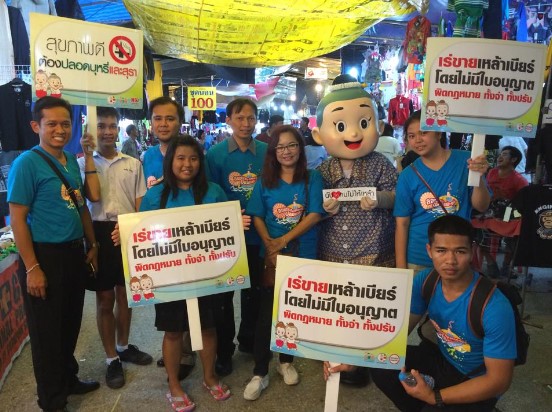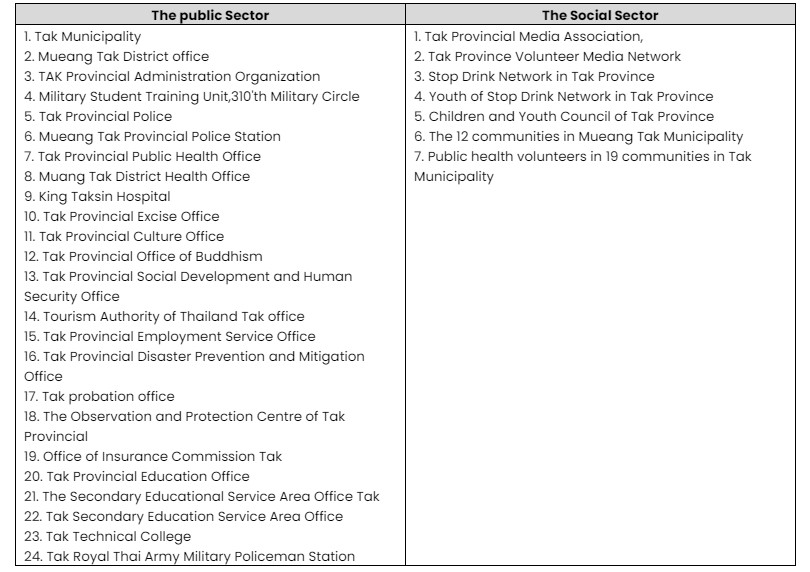Loy Krathong festival is a Thai tradition taking place on a full moon night of the 12th month in the traditional Thai lunar calendar. People float Krathongs or lanterns with a belief that is the means to pay respect to the river. This festival is celebrated nationwide in Thailand, normally in November each year, usually together with other features such as trade fairs and cultural shows. “Loy Krathong Sai Festival is a line of Krathongs made from coconut shells)” in Tak province, in the lower northern region of Thailand.

Loy Krathong Sai Festival was a beautiful custom until alcohol became involved. However, it has turned into a beautiful and remarkable cultural event with a return benefit to Tak’s tourism and local economy since 2012. It is also among the top five famous destinations for Thai and foreign tourists. Each year, there are about two hundred thousand tourists participating. This change is due to concerted efforts among 32 stakeholders in Tak province in driving the Alcohol-free Loy Krathong Sai Festival for almost ten years.
Why promote alcohol-free?
In 2011, Loy Krathong Sai Festival was like an outdoor trade fair and full of stalls selling miscellaneous products, including food and beverages by traders and retailers from other provinces. There were 32 drink stalls selling alcoholic beverages which were popular and crowded with adolescents. As a result, there were many flights and violent events due to intoxicated participants at the festival, as well as alcohol-related road traffic accidents. For some years, the alcohol-related violence ended with the injuries and deaths of the participants. Due to unsafe conditions, elders, women, and children avoided travel and joined this festival.
With high concerns, Ms.Siwaphon Kongsab, a coordinator for Stop Drink Network in Tak Province met with The Tak municipal mayor, the host of the Loy Krathong Sai Festival, and reported these avoidable losses due to alcohol selling in the festival, including the violations of the Alcoholic Beverage Control Act B.E. 2551 (A.D. 2008) which prohibits the sale and consumption of alcohol in the public park. As a result, in 2012, Tak Municipality initiated the Alcohol-free Loy Krathong Sai Festival by collaborating with different agencies.
Preventing alcohol-related violence with all hands
Three main strategies that have been used for promoting and sustaining the Alcohol-free Loy Krathong Sai Festival since 2012 include (i) creating safe spaces and alternative activities for all, (ii) establishing effective public relations and educational campaigns, and (iii) strengthening law enforcement.

Tak Municipality has changed and reimagined a dangerous Loy Krathong festival into a safe, enjoyable, and creative festival by (i) replacing alcoholic drinks stalls with stalls that sell food and dishes from popular restaurants in Tak and (ii) organizing many creative features and activities that are friendly to family and children to travel. Every shop selling at the festival must sign a contract not to sell alcoholic beverages. Whilst, there are many cultural and entertaining programs shown by students and local people such as singing contests, dance contests, and cultural dance by students.
For public relations activities and campaigns to raise people’s awareness about alcohol harm in the community and promote alcohol-free events. It is led by Tak Municipality, Tak Provincial Media Association, Tak Province Volunteer Media Network, Tak Stop Drink Network, etc. The alcohol-free campaigns have been communicated through many means such as billboards and radio programs. Moreover, they have cooperated with entrepreneurs, the group has also entered factories and informed employees, especially Burmese employees. There were 58,782 legal Burmese employees in the first quarter of 2019, which was before the COVID-19 pandemic (Province Labour Office Tak, n.d.). Tak Provincial Media Association has also trained students to be moderators to promote alcohol-free festivals at festivals.

Critically, Tak Stop Drink Network has actively led the stakeholders including public sectors and civil society sectors in alcohol law enforcement mission at the festival, especially the Alcoholic Beverage Control Act B.E. 2551 (A.D. 2008). They convened stakeholder meetings for planning, monitoring, and evaluation, as well as provided relevant equipment and other support. Three operational teams were established for this mission, including the warning team, the evidence collecting team (for legal process purposes), and the arrest team.
Started from 10 agencies in 2012, nowadays the collaboration has grown with 32 stakeholders who actively engaged in the promoting alcohol-free Loy Krathong Sai Festival (list of stakeholders shown in below table).

The benefits of an alcohol-free Loy Krathong Sai Festival
There have been many benefits of the Alcohol-free Loy Krathong Sai Festival such as a reduced number of road accidents and fights at the event Therefore, lesser public officers, including police officers, for taking care of safety at the event are needed. Moreover, the number of tourists has increased, but drinking in public parks seems to be decreasing. Positively, this multisectoral collaboration has also expanded the action to other areas for promoting the health and well-being of Tak people such as road safety among college students.
Acknowledgment
The content of this article is part of the project of knowledge management for promoting alcohol-free festivals of the Stop Drink Network
Moreover, the number of tourists has increased, but drinking in public parks seems to be decreasing. Positively, this multisectoral collaboration has also expanded the action to other areas for promoting the health and well-being of Tak people such as road safety among college students.

Theertham Wutthiwatchaikaew (Writer)
An academician for Stop Drink Network, a civil society organization in Thailand, a Ph.D. student in the Development and Sustainability Program at the Asian Institute of Technology (AIT). I am interested in community development, public policy, human resource development, alcohol-free promotion, road accidents caused by drink-driving, SDGs, etc.
Let’s make a beautiful world together.

Apichaya Yenjai (Editor)
Plan to build a different future and seek to develop herself consistently through various kinds of activities

Orratai Waleewong (Advisor)
Researcher at International Health Policy Program (IHPP), Thailand
Works Cited
Province Labour Office Tak. (n.d.). Foreign workers in Tak Province, https://tak.mol.go.th/wp-content/uploads/sites/19/2019/07/aerngngaantaangdaaw-aeplng.pdf Accessed 16 June 2022.

Stop Drinking on Buddhist Lent Day: Family behind the scene
Alcohol is one of the factors of domestic violence, especially towards women. The Thai government then attempts to solve this problem by applying alcohol ban

What ASEAN could do to address drink-driving for safer lives?
Road traffic accidents, drinking-driving, and their consequences in ASEAN Over 90% of deaths from road traffic accidents occur in low-& middle-income countries. Six

A decade of the Women and Men Progressive Movement Foundation (WMP) who has addressed alcohol-related domestic violence and fought for social justice and gender equality in Thai society
“According to a concept on gender inequality and male dominance, our case studies affirmed that men view alcohol drinking as symbols of masculinity,” said Jadej

Multisectoral Collaboration in Action for Alcohol-free Festivals: A Case Study of the Loy Krathong Sai Festival in Thailand
Loy Krathong festival is a Thai tradition taking place on a full moon night of the 12th month in the traditional Thai lunar calendar.

“Stop drinking, start going to the temple”: a successful case study of community coalition for alcohol rehabilitation in Surin Province, Thailand
Located in Prasat Thanong Sub-district, Prasat District, Surin Provinces, Thailand, Sawang Arom Temple, a simplistic and small temple with 6-7 monks has served as a

Alcohol control policies in China: Review and recommendations
Alcoholic beverages have been consumed in China throughout recorded history. In the present day, drinking alcohol is customary at many social gatherings, especially events such

